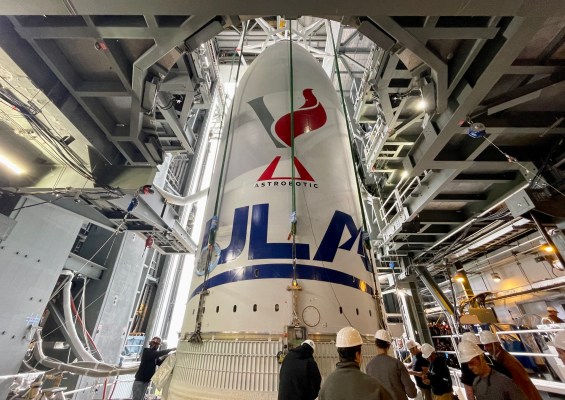The countdown to launch is on. United Launch Alliance’s Vulcan Centaur rocket has been rolled to the launch pad at Cape Canaveral Space Force Station ahead of its early Monday morning launch, a mission that could end with the first fully private spacecraft landing on the moon.
Vulcan’s primary payload is Astrobotic’s Peregrine lunar lander. If all goes to plan, Peregrine will embark on a journey to the moon over the span of around 1.5 months, before attempting to land on the surface on February 23. The two companies had been targeting a Christmas Eve launch, but ULA decided to postpone due to ground system issues.
That’s how we roll. #ToryTimelapse #VulcanRocket pic.twitter.com/3bz9LgMZ0r
— Tory Bruno (@torybruno) January 5, 2024
“If you’ve been following the lunar industry, you understand landing on the Moon’s surface is incredibly difficult,” Astrobotic CEO John Thornton said in a press release last month. “With that said, our team has continuously surpassed expectations and demonstrated incredible ingenuity during flight reviews, spacecraft testing, and major hardware integrations. We are ready for launch, and for landing.”
ULA and Pittsburgh-based Astrobotic are not the only firms with much riding on Monday’s launch. This will also be the first time Blue Origin’s BE-4 rocket engines take flight on Vulcan’s first-stage booster (after years of delays), and the first mission as part of NASA’s program to kickstart payload delivery to the lunar surface.
That program, Commercial Lunar Payload Services (CLPS), has collectively doled out hundreds of millions to spur private development of moon landers. For this mission, Astrobotic was awarded $79.5 million from NASA in 2019.
The mission is slated to take off at 2:18 a.m. ET Monday. NASA will livestream the mission on its YouTube channel.
The launch will be the first of many heading to the moon this year. Other lunar launches slated for 2024 include Intuitive Machines IM-1 lander, which is scheduled for liftoff on a SpaceX Falcon 9 in February; Japanese firm ispace’s second lunar mission (their first lander crashed into the lunar surface shortly before touchdown); and Firefly Aerospace’s Blue Ghost lander in the third quarter of 2024. (Both Intuitive Machines’ and Firefly’s missions are part of the CLPS program.)
With such a lineup, it’s highly likely that 2024 will be the year that a private company lands a spacecraft on the moon for the first time, and the first time an American entity has gone to the lunar surface since 1972.
Astrobotic will attempt to land Peregrine near a region of the moon known as the Gruithuisen Domes, and it will be delivering a handful of NASA payloads and scientific instruments that will endeavor to better understand the lunar environment. Peregrine will also be delivering around 15 non-NASA payloads, including a rover from Carnegie Mellon University and a robotic project called Coleman from the Mexican Space Agency.
